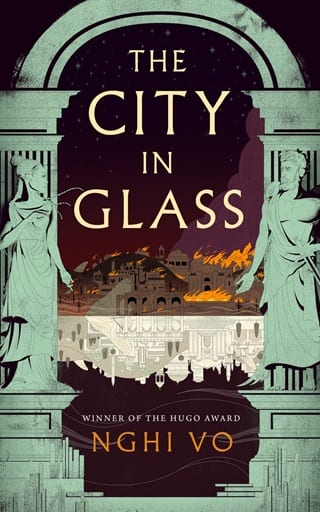Chapter Four
FOUR
Azril before the angels came was known for many things. It was known for the silk and spices that it passed from Kailin to Combes and for the horses and brass it sent back in return. It was known as a city of license, which was to say, a city of freedom, and it attracted people seeking it. It was known for its observatory, its scholars, its sewers, its anchoresses in the cliff walls and its necromancers in the streets, for all the stories that the world told about it and that Azril told about itself in whispers and on its very banners.
Vitrine, if she wanted Azril back, could not start there, no matter how much she ached to see the banners snapping in the wind or the tall ships in the harbor. She couldn’t grow an observatory out of mud. She couldn’t even grow an observatory out of marble or quartz lenses or learned people. Instead, she needed to start with the mud itself, the river mud that cut through the plain from the west and the harbor mud that had come from herself.
The river was reduced in its banks, the clay baked to near-porcelain hardness by the blast. The marshland beyond the city was gone, and Vitrine wondered with brief bitterness what share the frogs and snakes and turtles that lived among the wild cane had had in the angels’ punishment. Then she put the bitterness away and got to work, because anger could start a thing, but it took endurance and forbearance and patience to finish it. She was not skilled in those things, but for Azril, she would learn, and so she went to stand in the water.
The trickle of water flowing from the mountains was still warm from the conflagration. In what she was already beginning to think of as the time before, the water there would have risen up to the crown of her head and past it, but now it did not even reach her knees.
The mud shifted under Vitrine’s toes and she could feel the dross of a few hundred years under her soles. They called the children who came to dig for treasure at low ebb marshfrogs, and mostly, they turned up bone buttons and clay pipes, the trash of their great-great-grandparents made fascinating by age and wear. Only the summer previously, a student from the university had found the diadem worn by Sophia Adare. Vitrine had known that Sophia had not taken her jewels and run to far Mato Lorno, and then the rest of the city knew as well.
She reached down into the mud and sloshed water through the handful she drew up until the silt and grit washed away. She was left with an old coin cut with three stalks of wheat, a bit of shattered worn bone, and a hairpin set with a small chunk of rough garnet. She tucked the coin into a fold of her sailcloth skirt, and threw the bone back, but she considered the garnet hairpin carefully. Garnet was plentiful in the cliffs by Azril, usually crumbled down to grit to grind far finer gems. They had worn it long ago when they had no better, and as soon as they could, they went about in starred sapphires and bloody rubies instead. No one wore garnets but those who lived on the floodplains by the river, their shanties so routinely flooded out that they never cared to own anything but what they wore on them.
At last Vitrine fixed the garnet pin in her hair, and then she bent to put her hands in the water.
“Come on,” she whispered to the water. “Come on. Come back. Don’t you want to go to sea? Are you not tired of the mountains and the ice? Come and dance. Come and see.”
What fire had seared, water could not heal at once, but it would be a beginning. Vitrine stood in the river, swirling her hand through it to make tiny eddies, little tides. The river had been there before her, and she wouldn’t insult it by grabbing and pulling. Instead, she only called and coaxed, summoning it the way it wanted to go in the first place.
In a few months, a thin winter came, no snow but a knifelike chill in the wind and a numbing one in the water. Still she stood as the water withdrew, sluggish now and cold. She refused to be disheartened as she so often was in the winter. Instead she stirred the river with her hands, calling it, telling it how she missed it, and how when the people returned to Azril, for they would return, how they would garland it with flowers, swim in its depths, and be taken in its floods. Frost stiffened her hair, and she was like a dead thing stood in the water, no better than the shattered spars that stood in the harbor or the broken plinths stood up in the town. She did not turn to look at them. She was speaking to the river.
The days clipped shorter and shorter until midwinter, when Vitrine could breathe in at dawn and exhale at dusk. She was still, nothing but desire and patience and a chill that seeped into her, putting laceworks of frost over the surface of her glass case.
“Come,” she said through lips stiffened with cold, and then finally, when the days stretched like cats and as the sky shed its gray, the water finally did.
In her bones, Vitrine felt the distant rumble in the mountains, jags of ice and meltwater come thundering down the hills. It was dangerous for it to come this fast, but she had called it very sweetly. Now the water rushed towards her, flooding its banks as it came, destroying the unwary villages up the slopes of the mountain and splintering the bridges that had cuffed it for so long.
Holding her breath, Vitrine stood up at last, her spine creaking like a ship against the wind as she looked upriver. She heard its rumble, she felt the way the world shifted to make way for water that demanded the sea.
The ice broke in shards from her skin and her braids and her skirts as the meltwater came rushing towards her, and it struck her so hard that she gasped from the pain and the exhilaration of it, cold enough to freeze her bones and hope enough to set fire to her book. She opened her arms and let the water tug them as if it wanted to tear them off her body, and all in a rush the river rose over her head, carrying her breath away like the lives of all the people it had drowned.
It was far from enough, but it was a beginning, and when she had had enough of the river trying to kill her in its great and wild way, Vitrine waded for the shore. Mud dragged at her every footstep and the current threatened to pull her under, but she only ran her hand through the eddying flow, as affectionate as a shepherd might be with a recalcitrant ewe.
It was only when she had gained the new shallows that she realized she was not alone.
The angel stood on the dry winter bank, hands clasped behind his back and his mouth drawn tight. She could see how uneasy he was, and she could see as well the part of herself that had become lodged in him, like a thorn set in the arch of an unwary foot. Her curse lived in his heart, twisted it, deformed it. He would have to live and grow around it if he wanted to live at all. She glared at him, still up to her shins in mud, and she spread her hands out wide.
“Well?” she demanded. “What else can you take from me?”
“It is not given to me to take anything from you today,” he said, and she snorted. Angels could only speak the truth, and she still didn’t believe him.
She gathered her sailcloth skirts up in a dripping mass and stormed towards the shore, realizing in just a few strides that her path would take her straight to him and through him. The force of the river’s return had done something to her, however, and Vitrine moved forward, daring with her heels in the mud and her lowered brow for the angel to stop her.
He was every inch a human man, born in blood and in those violent days, like to die in it as well, flesh and water and bone and gall, and in that quick glance she could see beyond to what he also was, the pillar of light, the divine will, and the thing that swords dreamed of being. Vitrine was only what could be seen, though made of tougher and more malleable clay than humans were. She had no towering form, and what people saw of her, when they saw her at all, was mostly true.
She came up to the bank until only a handspan separated them, until she could reach out and take that part of herself in him back, until he could reach out and set her on fire with nothing more than a touch. She came close enough that she could reach up and touch him.
Then, as suddenly as he had appeared, he was gone, and Vitrine was alone on the riverbank save for the thundering water. The world was larger without his weight on it, she could breathe easier, and, her temper giving way suddenly, she did. She drew in deep, greedy breaths that had been stopped by the fear of seeing him again, and then her knees gave out beneath her completely as she sat down hard.
Demons didn’t like to cry, but Vitrine rocked on the bank, her arms around her, her mouth open in a toneless high wail that burned her chest and clawed its way out of her throat. The first birds that came back with the spring heard her cry, and they fell out of the trees, stunned. When they rose up, they were streaked with white across their dark wings and their neat heads, a lethal white that killed every third chick that bore it. They were changed by Vitrine’s grief, and it lived in them forever, the grief-stricken weavers along the river Rune.
Finally, hollowed out for the moment and tired of her sorrow, Vitrine rose up from the mud and made her way back to the city of Azril.
Angels or not, there was work to be done.
 Fullepub
Fullepub 



